weight CADILLAC SRX 2007 1.G User Guide
[x] Cancel search | Manufacturer: CADILLAC, Model Year: 2007, Model line: SRX, Model: CADILLAC SRX 2007 1.GPages: 522, PDF Size: 2.71 MB
Page 325 of 522
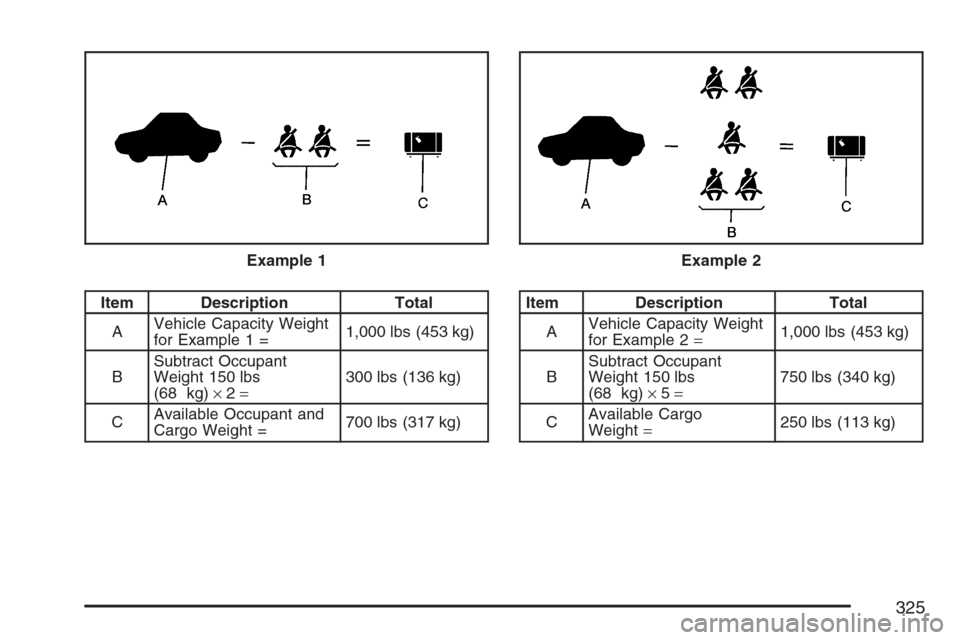
Item Description Total
AVehicle Capacity Weight
for Example 1 =1,000 lbs (453 kg)
BSubtract Occupant
Weight 150 lbs
(68 kg)×2=300 lbs (136 kg)
CAvailable Occupant and
Cargo Weight =700 lbs (317 kg)Item Description Total
AVehicle Capacity Weight
for Example 2=1,000 lbs (453 kg)
BSubtract Occupant
Weight 150 lbs
(68 kg)×5=750 lbs (340 kg)
CAvailable Cargo
Weight=250 lbs (113 kg) Example 1
Example 2
325
Page 326 of 522
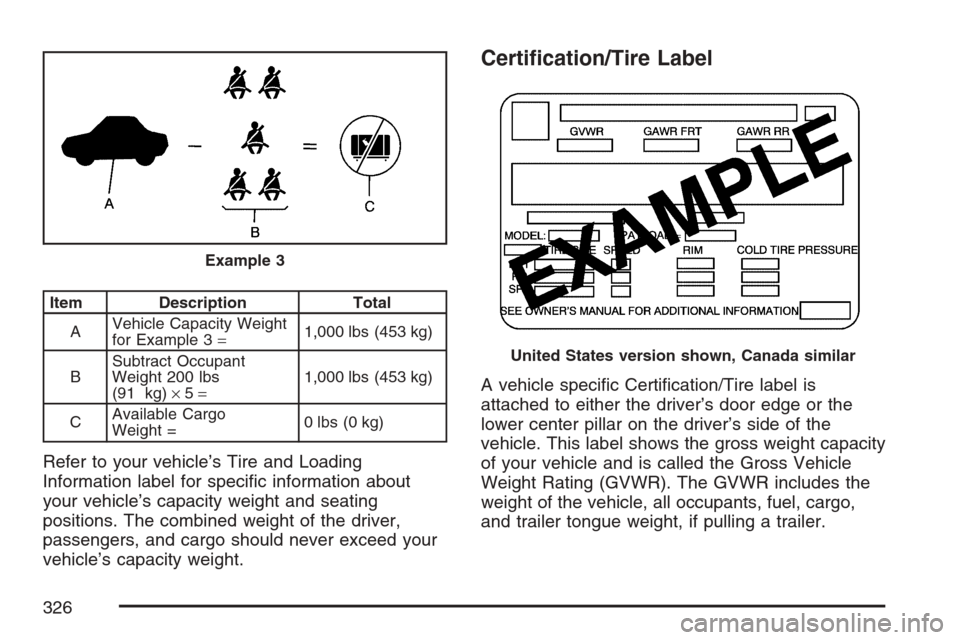
Item Description Total
AVehicle Capacity Weight
for Example 3=1,000 lbs (453 kg)
BSubtract Occupant
Weight 200 lbs
(91 kg)×5=1,000 lbs (453 kg)
CAvailable Cargo
Weight =0 lbs (0 kg)
Refer to your vehicle’s Tire and Loading
Information label for speci�c information about
your vehicle’s capacity weight and seating
positions. The combined weight of the driver,
passengers, and cargo should never exceed your
vehicle’s capacity weight.
Certi�cation/Tire Label
A vehicle speci�c Certi�cation/Tire label is
attached to either the driver’s door edge or the
lower center pillar on the driver’s side of the
vehicle. This label shows the gross weight capacity
of your vehicle and is called the Gross Vehicle
Weight Rating (GVWR). The GVWR includes the
weight of the vehicle, all occupants, fuel, cargo,
and trailer tongue weight, if pulling a trailer.
Example 3
United States version shown, Canada similar
326
Page 327 of 522
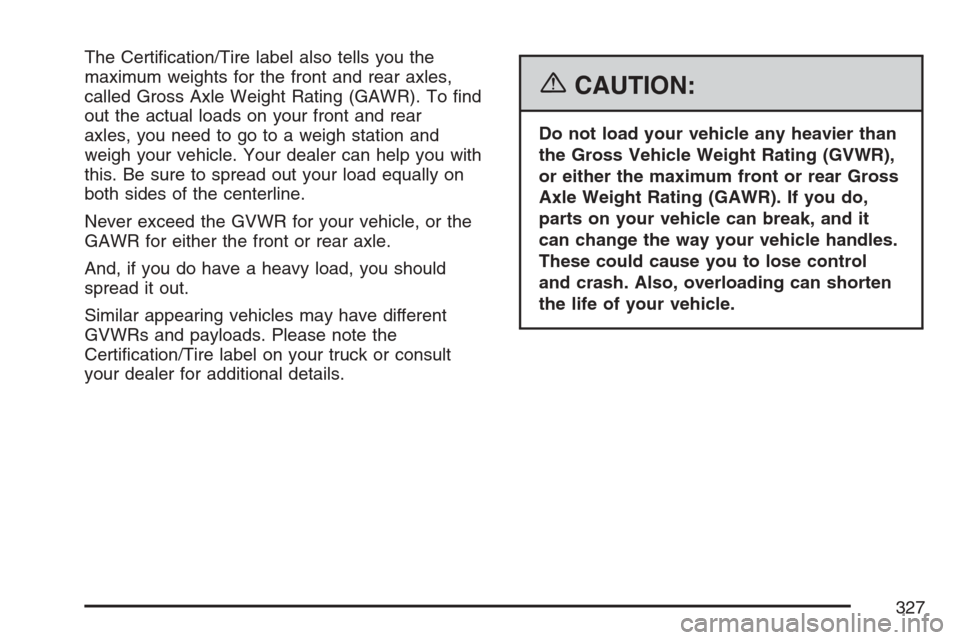
The Certi�cation/Tire label also tells you the
maximum weights for the front and rear axles,
called Gross Axle Weight Rating (GAWR). To �nd
out the actual loads on your front and rear
axles, you need to go to a weigh station and
weigh your vehicle. Your dealer can help you with
this. Be sure to spread out your load equally on
both sides of the centerline.
Never exceed the GVWR for your vehicle, or the
GAWR for either the front or rear axle.
And, if you do have a heavy load, you should
spread it out.
Similar appearing vehicles may have different
GVWRs and payloads. Please note the
Certi�cation/Tire label on your truck or consult
your dealer for additional details.
{CAUTION:
Do not load your vehicle any heavier than
the Gross Vehicle Weight Rating (GVWR),
or either the maximum front or rear Gross
Axle Weight Rating (GAWR). If you do,
parts on your vehicle can break, and it
can change the way your vehicle handles.
These could cause you to lose control
and crash. Also, overloading can shorten
the life of your vehicle.
327
Page 328 of 522
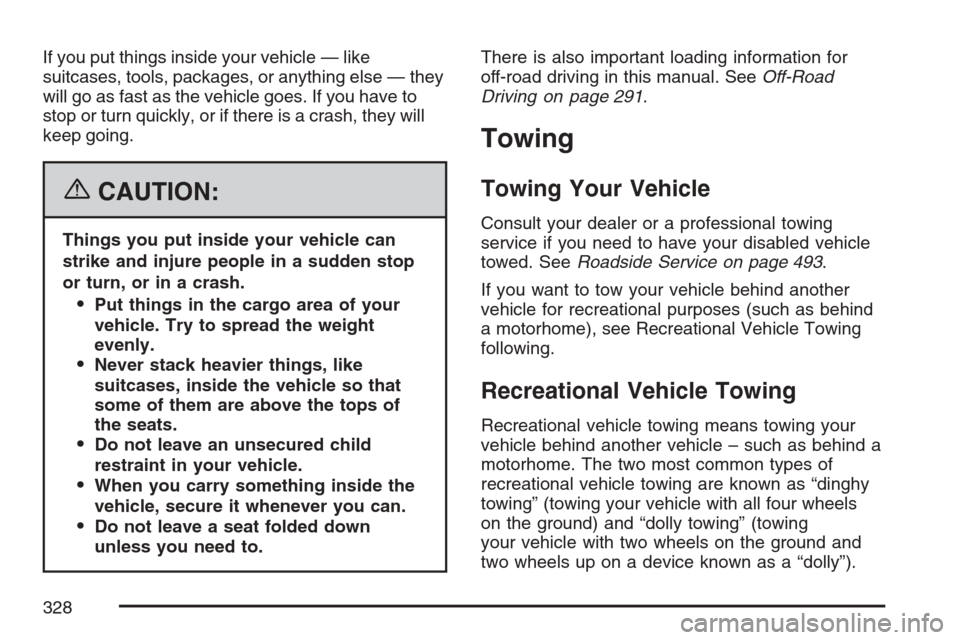
If you put things inside your vehicle — like
suitcases, tools, packages, or anything else — they
will go as fast as the vehicle goes. If you have to
stop or turn quickly, or if there is a crash, they will
keep going.
{CAUTION:
Things you put inside your vehicle can
strike and injure people in a sudden stop
or turn, or in a crash.
Put things in the cargo area of your
vehicle. Try to spread the weight
evenly.
Never stack heavier things, like
suitcases, inside the vehicle so that
some of them are above the tops of
the seats.
Do not leave an unsecured child
restraint in your vehicle.
When you carry something inside the
vehicle, secure it whenever you can.
Do not leave a seat folded down
unless you need to.There is also important loading information for
off-road driving in this manual. SeeOff-Road
Driving on page 291.
Towing
Towing Your Vehicle
Consult your dealer or a professional towing
service if you need to have your disabled vehicle
towed. SeeRoadside Service on page 493.
If you want to tow your vehicle behind another
vehicle for recreational purposes (such as behind
a motorhome), see Recreational Vehicle Towing
following.
Recreational Vehicle Towing
Recreational vehicle towing means towing your
vehicle behind another vehicle – such as behind a
motorhome. The two most common types of
recreational vehicle towing are known as “dinghy
towing” (towing your vehicle with all four wheels
on the ground) and “dolly towing” (towing
your vehicle with two wheels on the ground and
two wheels up on a device known as a “dolly”).
328
Page 331 of 522
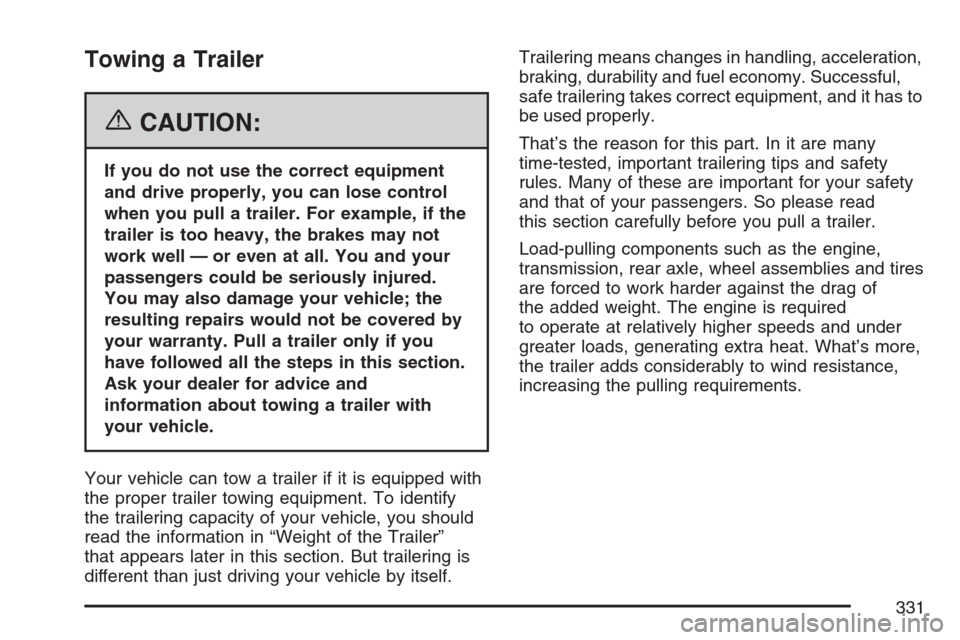
Towing a Trailer
{CAUTION:
If you do not use the correct equipment
and drive properly, you can lose control
when you pull a trailer. For example, if the
trailer is too heavy, the brakes may not
work well — or even at all. You and your
passengers could be seriously injured.
You may also damage your vehicle; the
resulting repairs would not be covered by
your warranty. Pull a trailer only if you
have followed all the steps in this section.
Ask your dealer for advice and
information about towing a trailer with
your vehicle.
Your vehicle can tow a trailer if it is equipped with
the proper trailer towing equipment. To identify
the trailering capacity of your vehicle, you should
read the information in “Weight of the Trailer”
that appears later in this section. But trailering is
different than just driving your vehicle by itself.Trailering means changes in handling, acceleration,
braking, durability and fuel economy. Successful,
safe trailering takes correct equipment, and it has to
be used properly.
That’s the reason for this part. In it are many
time-tested, important trailering tips and safety
rules. Many of these are important for your safety
and that of your passengers. So please read
this section carefully before you pull a trailer.
Load-pulling components such as the engine,
transmission, rear axle, wheel assemblies and tires
are forced to work harder against the drag of
the added weight. The engine is required
to operate at relatively higher speeds and under
greater loads, generating extra heat. What’s more,
the trailer adds considerably to wind resistance,
increasing the pulling requirements.
331
Page 332 of 522
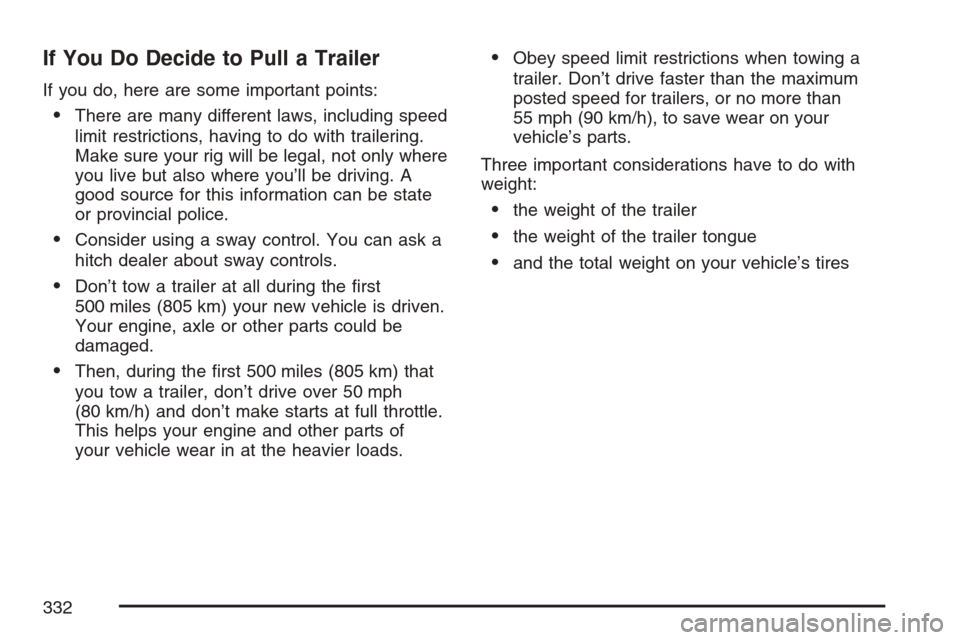
If You Do Decide to Pull a Trailer
If you do, here are some important points:
There are many different laws, including speed
limit restrictions, having to do with trailering.
Make sure your rig will be legal, not only where
you live but also where you’ll be driving. A
good source for this information can be state
or provincial police.
Consider using a sway control. You can ask a
hitch dealer about sway controls.
Don’t tow a trailer at all during the �rst
500 miles (805 km) your new vehicle is driven.
Your engine, axle or other parts could be
damaged.
Then, during the �rst 500 miles (805 km) that
you tow a trailer, don’t drive over 50 mph
(80 km/h) and don’t make starts at full throttle.
This helps your engine and other parts of
your vehicle wear in at the heavier loads.
Obey speed limit restrictions when towing a
trailer. Don’t drive faster than the maximum
posted speed for trailers, or no more than
55 mph (90 km/h), to save wear on your
vehicle’s parts.
Three important considerations have to do with
weight:
the weight of the trailer
the weight of the trailer tongue
and the total weight on your vehicle’s tires
332
Page 333 of 522
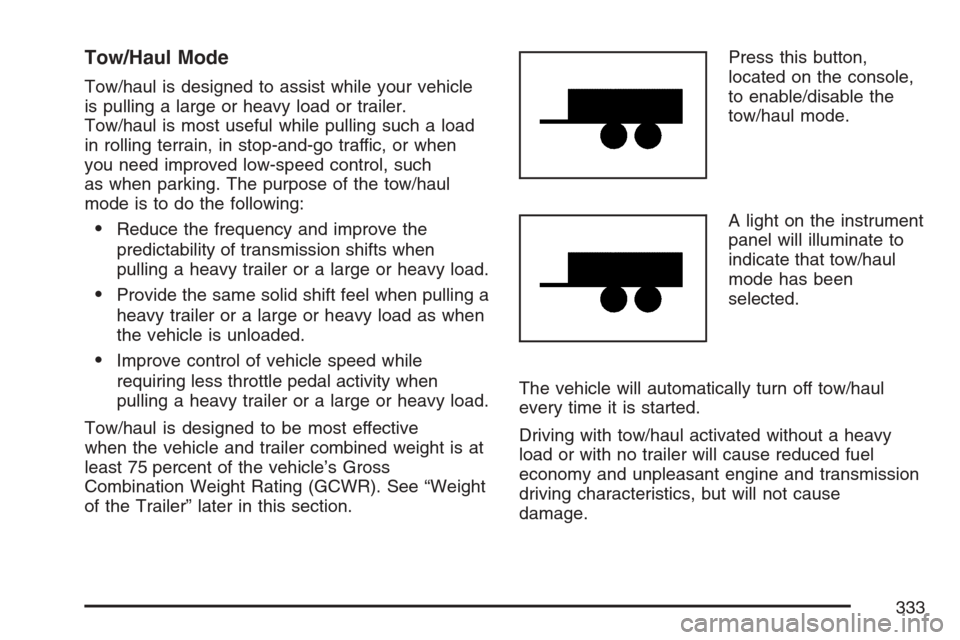
Tow/Haul Mode
Tow/haul is designed to assist while your vehicle
is pulling a large or heavy load or trailer.
Tow/haul is most useful while pulling such a load
in rolling terrain, in stop-and-go traffic, or when
you need improved low-speed control, such
as when parking. The purpose of the tow/haul
mode is to do the following:
Reduce the frequency and improve the
predictability of transmission shifts when
pulling a heavy trailer or a large or heavy load.
Provide the same solid shift feel when pulling a
heavy trailer or a large or heavy load as when
the vehicle is unloaded.
Improve control of vehicle speed while
requiring less throttle pedal activity when
pulling a heavy trailer or a large or heavy load.
Tow/haul is designed to be most effective
when the vehicle and trailer combined weight is at
least 75 percent of the vehicle’s Gross
Combination Weight Rating (GCWR). See “Weight
of the Trailer” later in this section.Press this button,
located on the console,
to enable/disable the
tow/haul mode.
A light on the instrument
panel will illuminate to
indicate that tow/haul
mode has been
selected.
The vehicle will automatically turn off tow/haul
every time it is started.
Driving with tow/haul activated without a heavy
load or with no trailer will cause reduced fuel
economy and unpleasant engine and transmission
driving characteristics, but will not cause
damage.
333
Page 334 of 522
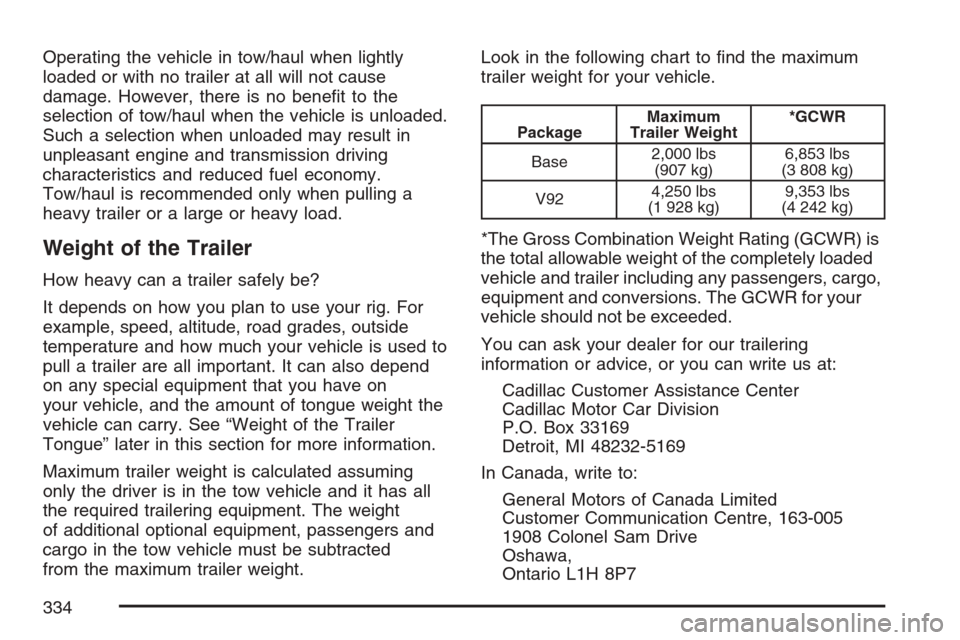
Operating the vehicle in tow/haul when lightly
loaded or with no trailer at all will not cause
damage. However, there is no bene�t to the
selection of tow/haul when the vehicle is unloaded.
Such a selection when unloaded may result in
unpleasant engine and transmission driving
characteristics and reduced fuel economy.
Tow/haul is recommended only when pulling a
heavy trailer or a large or heavy load.
Weight of the Trailer
How heavy can a trailer safely be?
It depends on how you plan to use your rig. For
example, speed, altitude, road grades, outside
temperature and how much your vehicle is used to
pull a trailer are all important. It can also depend
on any special equipment that you have on
your vehicle, and the amount of tongue weight the
vehicle can carry. See “Weight of the Trailer
Tongue” later in this section for more information.
Maximum trailer weight is calculated assuming
only the driver is in the tow vehicle and it has all
the required trailering equipment. The weight
of additional optional equipment, passengers and
cargo in the tow vehicle must be subtracted
from the maximum trailer weight.Look in the following chart to �nd the maximum
trailer weight for your vehicle.
PackageMaximum
Trailer Weight*GCWR
Base2,000 lbs
(907 kg)6,853 lbs
(3 808 kg)
V924,250 lbs
(1 928 kg)9,353 lbs
(4 242 kg)
*The Gross Combination Weight Rating (GCWR) is
the total allowable weight of the completely loaded
vehicle and trailer including any passengers, cargo,
equipment and conversions. The GCWR for your
vehicle should not be exceeded.
You can ask your dealer for our trailering
information or advice, or you can write us at:
Cadillac Customer Assistance Center
Cadillac Motor Car Division
P.O. Box 33169
Detroit, MI 48232-5169
In Canada, write to:
General Motors of Canada Limited
Customer Communication Centre, 163-005
1908 Colonel Sam Drive
Oshawa,
Ontario L1H 8P7
334
Page 335 of 522
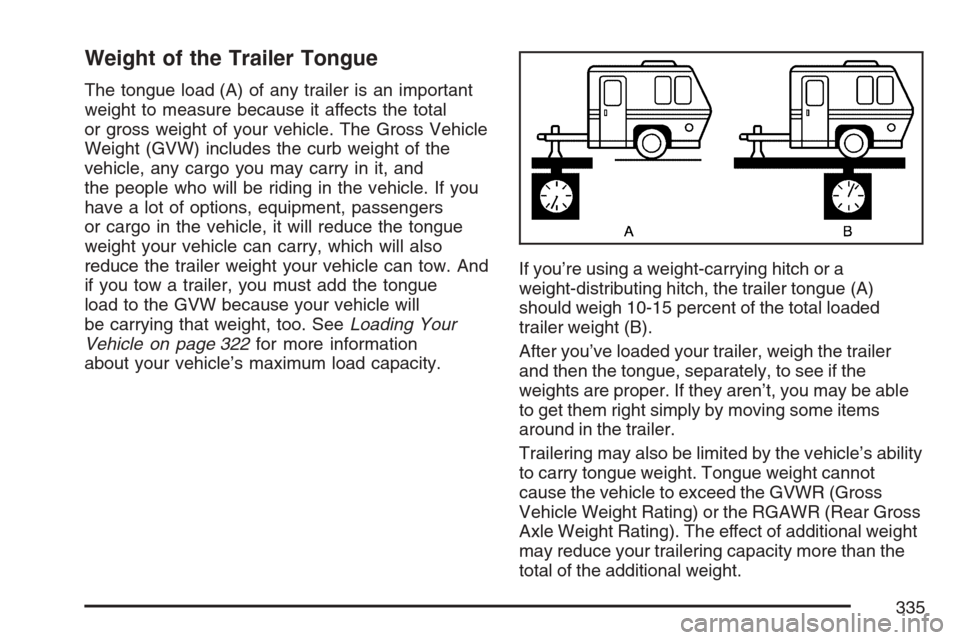
Weight of the Trailer Tongue
The tongue load (A) of any trailer is an important
weight to measure because it affects the total
or gross weight of your vehicle. The Gross Vehicle
Weight (GVW) includes the curb weight of the
vehicle, any cargo you may carry in it, and
the people who will be riding in the vehicle. If you
have a lot of options, equipment, passengers
or cargo in the vehicle, it will reduce the tongue
weight your vehicle can carry, which will also
reduce the trailer weight your vehicle can tow. And
if you tow a trailer, you must add the tongue
load to the GVW because your vehicle will
be carrying that weight, too. SeeLoading Your
Vehicle on page 322for more information
about your vehicle’s maximum load capacity.If you’re using a weight-carrying hitch or a
weight-distributing hitch, the trailer tongue (A)
should weigh 10-15 percent of the total loaded
trailer weight (B).
After you’ve loaded your trailer, weigh the trailer
and then the tongue, separately, to see if the
weights are proper. If they aren’t, you may be able
to get them right simply by moving some items
around in the trailer.
Trailering may also be limited by the vehicle’s ability
to carry tongue weight. Tongue weight cannot
cause the vehicle to exceed the GVWR (Gross
Vehicle Weight Rating) or the RGAWR (Rear Gross
Axle Weight Rating). The effect of additional weight
may reduce your trailering capacity more than the
total of the additional weight.
335
Page 336 of 522
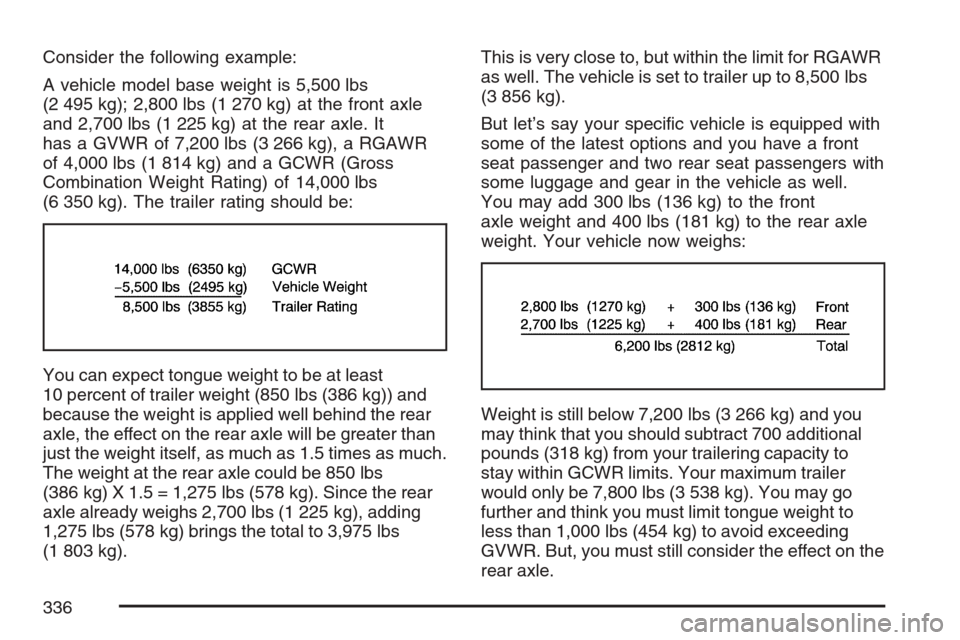
Consider the following example:
A vehicle model base weight is 5,500 lbs
(2 495 kg); 2,800 lbs (1 270 kg) at the front axle
and 2,700 lbs (1 225 kg) at the rear axle. It
has a GVWR of 7,200 lbs (3 266 kg), a RGAWR
of 4,000 lbs (1 814 kg) and a GCWR (Gross
Combination Weight Rating) of 14,000 lbs
(6 350 kg). The trailer rating should be:
You can expect tongue weight to be at least
10 percent of trailer weight (850 lbs (386 kg)) and
because the weight is applied well behind the rear
axle, the effect on the rear axle will be greater than
just the weight itself, as much as 1.5 times as much.
The weight at the rear axle could be 850 lbs
(386 kg) X 1.5 = 1,275 lbs (578 kg). Since the rear
axle already weighs 2,700 lbs (1 225 kg), adding
1,275 lbs (578 kg) brings the total to 3,975 lbs
(1 803 kg).This is very close to, but within the limit for RGAWR
as well. The vehicle is set to trailer up to 8,500 lbs
(3 856 kg).
But let’s say your speci�c vehicle is equipped with
some of the latest options and you have a front
seat passenger and two rear seat passengers with
some luggage and gear in the vehicle as well.
You may add 300 lbs (136 kg) to the front
axle weight and 400 lbs (181 kg) to the rear axle
weight. Your vehicle now weighs:
Weight is still below 7,200 lbs (3 266 kg) and you
may think that you should subtract 700 additional
pounds (318 kg) from your trailering capacity to
stay within GCWR limits. Your maximum trailer
would only be 7,800 lbs (3 538 kg). You may go
further and think you must limit tongue weight to
less than 1,000 lbs (454 kg) to avoid exceeding
GVWR. But, you must still consider the effect on the
rear axle.
336